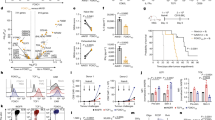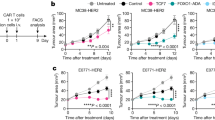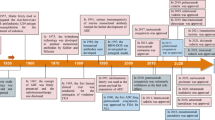Abstract
Chimeric antigen receptor (CAR) T-cell therapies have demonstrated durable and potentially curative therapeutic efficacy against B-cell leukemia in clinical trials. A CAR strategy can target any tumor surface antigens as long as an antigen-binding receptor can be generated. New CARs that target solid tumors and have the potential to target multiple tumor types are needed. In this study, B7H6, a ligand for the NK cell activating receptor NKp30, was targeted to create a CAR that targets multiple tumor types. B7H6 is expressed on various primary human tumors, including leukemia, lymphoma and gastrointestinal stromal tumors, but it is not constitutively expressed on normal tissues. B7H6-specific CAR T cells have robust cellular cytotoxicity and interferon-γ secretion when co-cultured with B7H6+ tumor cells, and they exhibit little self-reactivity to immature dendritic cells or pro-inflammatory monocytes. In vivo, B7H6-specific CAR T cells greatly enhanced the survival of RMA/B7H6 lymphoma-bearing mice. The long-term survivor mice were protected against a B7H6-deficient tumor re-challenge. This CAR therapy also decreased tumor burden in a murine ovarian cancer model. In conclusion, B7H6-specific CARs have the potential to treat B7H6+ hematologic and solid tumors.
This is a preview of subscription content, access via your institution
Access options
Subscribe to this journal
Receive 12 print issues and online access
$259.00 per year
only $21.58 per issue
Buy this article
- Purchase on Springer Link
- Instant access to full article PDF
Prices may be subject to local taxes which are calculated during checkout





Similar content being viewed by others
References
Porter DL, Levine BL, Kalos M, Bagg A, June CH . Chimeric antigen receptor-modified T cells in chronic lymphoid leukemia. N Engl J Med 2011; 365: 725–733.
Kalos M, Levine BL, Porter DL, Katz S, Grupp SA, Bagg A et al. T cells with chimeric antigen receptors have potent antitumor effects and can establish memory in patients with advanced leukemia. Sci Transl Med 2011; 3: 95ra73.
Grupp SA, Kalos M, Barrett D, Aplenc R, Porter DL, Rheingold SR et al. Chimeric antigen receptor-modified T cells for acute lymphoid leukemia. N Engl J Med 2013; 368: 1509–1518.
Brentjens RJ, Davila ML, Riviere I, Park J, Wang X, Cowell LG et al. CD19-targeted T cells rapidly induce molecular remissions in adults with chemotherapy-refractory acute lymphoblastic leukemia. Sci Transl Med 2013; 5: 177ra38.
Sadelain M, Brentjens R, Riviere I . The basic principles of chimeric antigen receptor design. Cancer Discov 2013; 3: 388–398.
Zhang T, Lemoi BA, Sentman CL . Chimeric NK-receptor-bearing T cells mediate antitumor immunotherapy. Blood 2005; 106: 1544–1551.
Barber A, Zhang T, DeMars LR, Conejo-Garcia J, Roby KF, Sentman CL . Chimeric NKG2D receptor-bearing T cells as immunotherapy for ovarian cancer. Cancer Res 2007; 67: 5003–5008.
Zhang T, Wu MR, Sentman CL . An NKp30-based chimeric antigen receptor promotes T cell effector functions and antitumor efficacy in vivo. J Immunol 2012; 189: 2290–2299.
Lanier LL . NK cell recognition. Annu Rev Immunol 2005; 23: 225–274.
Pende D, Parolini S, Pessino A, Sivori S, Augugliaro R, Morelli L et al. Identification and molecular characterization of NKp30, a novel triggering receptor involved in natural cytotoxicity mediated by human natural killer cells. J Exp Med 1999; 190: 1505–1516.
Brandt CS, Baratin M, Yi EC, Kennedy J, Gao Z, Fox B et al. The B7 family member B7-H6 is a tumor cell ligand for the activating natural killer cell receptor NKp30 in humans. J Exp Med 2009; 206: 1495–1503.
Delahaye NF, Rusakiewicz S, Martins I, Menard C, Roux S, Lyonnet L et al. Alternatively spliced NKp30 isoforms affect the prognosis of gastrointestinal stromal tumors. Nat Med 2011; 17: 700–707.
Fauriat C, Just-Landi S, Mallet F, Arnoulet C, Sainty D, Olive D et al. Deficient expression of NCR in NK cells from acute myeloid leukemia: Evolution during leukemia treatment and impact of leukemia cells in NCRdull phenotype induction. Blood 2007; 109: 323–330.
Ferlazzo G, Tsang ML, Moretta L, Melioli G, Steinman RM, Munz C . Human dendritic cells activate resting natural killer (NK) cells and are recognized via the NKp30 receptor by activated NK cells. J Exp Med 2002; 195: 343–351.
Simhadri VR, Reiners KS, Hansen HP, Topolar D, Simhadri VL, Nohroudi K et al. Dendritic cells release HLA-B-associated transcript-3 positive exosomes to regulate natural killer function. PLoS One 2008; 3: e3377.
Barth RJ Jr, Mule JJ, Spiess PJ, Rosenberg SA . Interferon gamma and tumor necrosis factor have a role in tumor regressions mediated by murine CD8+ tumor-infiltrating lymphocytes. J Exp Med 1991; 173: 647–658.
Qin Z, Blankenstein T . CD4+ T cell—mediated tumor rejection involves inhibition of angiogenesis that is dependent on IFN gamma receptor expression by nonhematopoietic cells. Immunity 2000; 12: 677–686.
Zhang T, Barber A, Sentman CL . Chimeric NKG2D modified T cells inhibit systemic T-cell lymphoma growth in a manner involving multiple cytokines and cytotoxic pathways. Cancer Res 2007; 67: 11029–11036.
Matta J, Baratin M, Chiche L, Forel JM, Cognet C, Thomas G et al. Induction of B7-H6, a ligand for the natural killer cell-activating receptor NKp30, in inflammatory conditions. Blood 2013; 122: 394–404.
Rhodes DR, Yu J, Shanker K, Deshpande N, Varambally R, Ghosh D et al. ONCOMINE: a cancer microarray database and integrated data-mining platform. Neoplasia 2004; 6: 1–6.
Zhang J, Grubor V, Love CL, Banerjee A, Richards KL, Mieczkowski PA et al. Genetic heterogeneity of diffuse large B-cell lymphoma. Proc Natl Acad Sci USA 2013; 110: 1398–1403.
Schaner ME, Ross DT, Ciaravino G, Sorlie T, Troyanskaya O, Diehn M et al. Gene expression patterns in ovarian carcinomas. Mol Biol Cell 2003; 14: 4376–4386.
Nielsen TO, West RB, Linn SC, Alter O, Knowling MA, O'Connell JX et al. Molecular characterisation of soft tissue tumours: a gene expression study. Lancet 2002; 359: 1301–1307.
Perou CM, Sorlie T, Eisen MB, van de Rijn M, Jeffrey SS, Rees CA et al. Molecular portraits of human breast tumours. Nature 2000; 406: 747–752.
Morgan RA, Yang JC, Kitano M, Dudley ME, Laurencot CM, Rosenberg SA . Case report of a serious adverse event following the administration of T cells transduced with a chimeric antigen receptor recognizing ERBB2. Mol Ther 2010; 18: 843–851.
Morton LM, Wang SS, Devesa SS, Hartge P, Weisenburger DD, Linet MS . Lymphoma incidence patterns by WHO subtype in the United States, 1992-2001. Blood 2006; 107: 265–276.
Connolly EM, Gaffney E, Reynolds JV . Gastrointestinal stromal tumours. Br J Surg 2003; 90: 1178–1186.
Barber A, Zhang T, Sentman CL . Immunotherapy with chimeric NKG2D receptors leads to long-term tumor-free survival and development of host antitumor immunity in murine ovarian cancer. J Immunol 2008; 180: 72–78.
Acknowledgements
We thank the National Cancer Institute Biological Resource Branch for providing recombinant human IL-2 and the staff of the Center for Comparative Medicine and Research in Dartmouth College for providing animal care. This work was supported by a grant from the NIH CA130911 and funds from the Center for Synthetic Immunity.
Author information
Authors and Affiliations
Corresponding author
Ethics declarations
Competing interests
Tong Zhang and Charles Sentman are inventors on a patent application covering the B7H6 CAR described in this study. This technology has been licensed by Cardio3 Biosciences. This work is managed in compliance with the policies of Dartmouth College. Ming-Ru Wu and Leslie DeMars declare no potential conflict of interest.
Rights and permissions
About this article
Cite this article
Wu, MR., Zhang, T., DeMars, L. et al. B7H6-specific chimeric antigen receptors lead to tumor elimination and host antitumor immunity. Gene Ther 22, 675–684 (2015). https://doi.org/10.1038/gt.2015.29
Received:
Revised:
Accepted:
Published:
Issue Date:
DOI: https://doi.org/10.1038/gt.2015.29
This article is cited by
-
Advances in immunology and immunotherapy for mesenchymal gastrointestinal cancers
Molecular Cancer (2023)
-
Engineering a natural ligand-based CAR: directed evolution of the stress-receptor NKp30
Cancer Immunology, Immunotherapy (2022)
-
Recent advances in immune therapies for gastric cancer
Cancer Gene Therapy (2021)
-
The integrated stress response promotes B7H6 expression
Journal of Molecular Medicine (2020)
-
T-bet promotes potent antitumor activity of CD4+ CAR T cells
Cancer Gene Therapy (2018)



